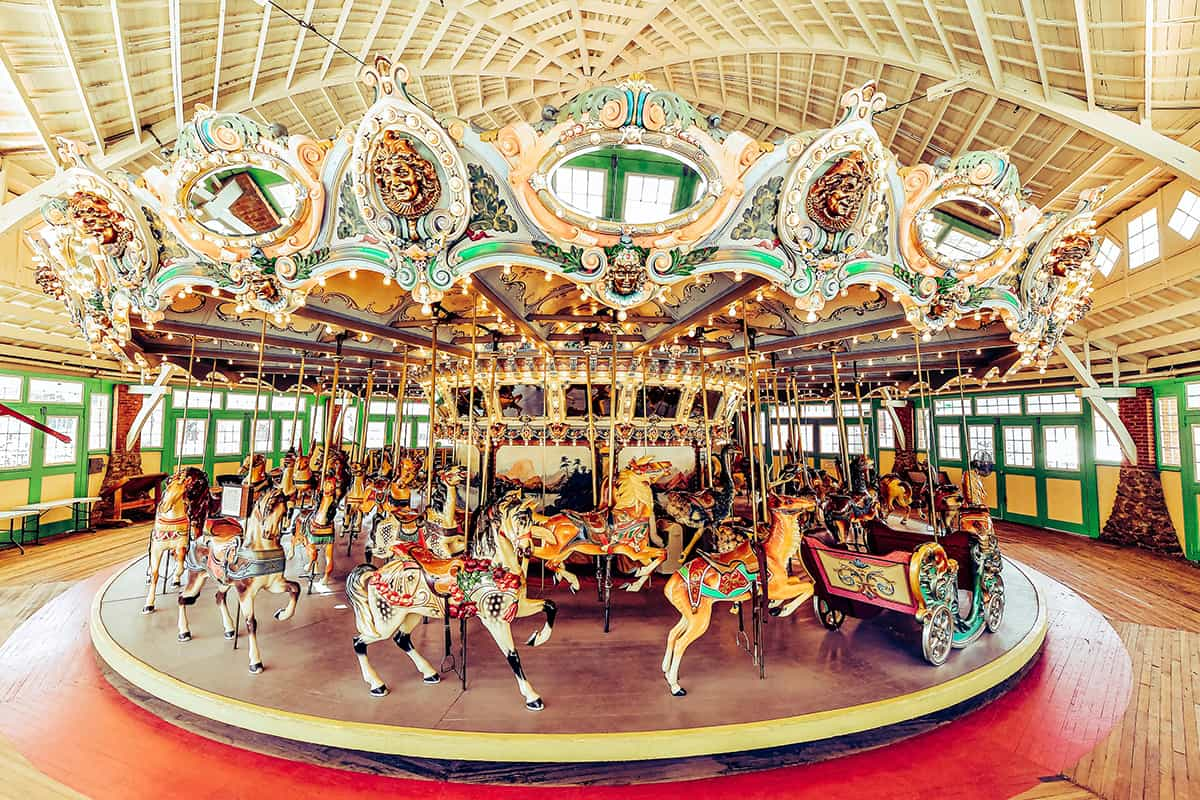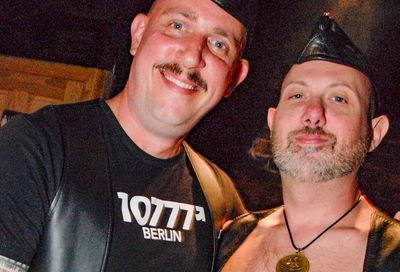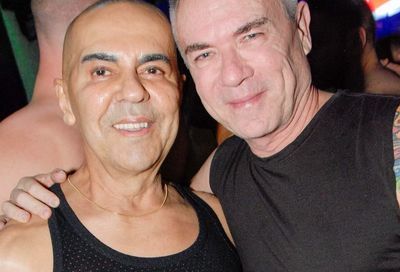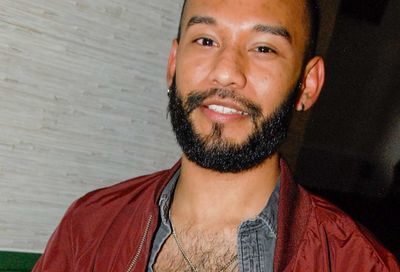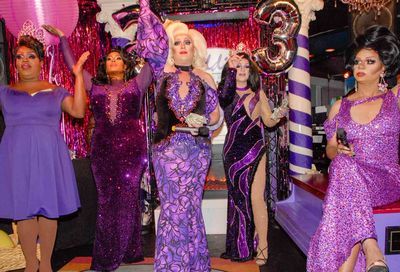Having a (Drag) Ball: Stephen Scott Wormley of “Dorian’s Closet”
Stephen Scott Wormley is ecstatic to portray the diva who taught the world about "throwing shade"

Dorian Corey introduced the world to the concept of throwing shade.
“I don’t tell you you’re ugly, but I don’t have to tell you, because you already know you’re ugly,” he said in Paris Is Burning, Jennie Livingston’s cult documentary about the Harlem ball scene in the ’80s that came to define drag and gave a generation of gay people voguing, not to mention a litany of catchprases.
Even if you don’t know the film, chances are you’ve seen Corey’s highly GIFable description of shade.
“She’s sitting in her chair, and she’s kind of moving her hand back,” says Stephen Scott Wormley. “And she goes, ‘And that’s shade.’ I have that saved in my phone ready to go at any moment.”
Wormley has been sharing the GIF in text messages for several years now, but it took on new resonance when the actor signed on to portray Corey in Dorian’s Closet, currently enjoying a world premiere at Rep Stage in Columbia, Md.
Loosely based on the life of Dorian Corey, the musical is written by Richard Mailman and features music by Ryan Haase. It also only obliquely references Livingston’s 1991 documentary, which presented Corey as a matriarch in the ball world.
“Even though she’s a female impersonator, I call her a woman,” Wormley says. “She is someone very talented, who has dreams of being a star, and comes to New York to try to pursue those dreams.” The musical explores Corey’s life and career, with a particular focus beyond the ball culture of the movie. “Sally’s [nightclub] wasn’t really in Paris Is Burning, but that’s where Dorian got her start,” Wormley says. A few years after Corey died, so did Sally’s, a victim of then-Mayor Rudolph Giuliani’s Disneyfication of the seedy Times Square neighborhood where it was housed.
Corey’s death in 1993 revealed an unexpectedly shady past, a reality evoked by the musical’s title. Mailman and Haase have taken a deep dive to examine — and, more importantly, imagine — Corey’s life and career in their fictionalized account. “Because all of the details from her life weren’t recorded and we don’t have the facts, they had to fill in some of the blanks,” says Wormley.
Wormley was initially tapped to play the supporting character Pepper LaBeija, another famous queen from Paris Is Burning. However, shortly after casting, director Joseph W. Ritsch decided to go in a different direction, making Wormley the lead. The actor, last seen in the area as a supporting player in Signature Theatre’s Jelly’s Last Jam, is thrilled by the challenge of originating a new, leading role and the opportunity he’s had to help shape the work. “This has been such a big undertaking, especially for this theater,” he says. “This show is huge.”
“Being Dorian has been a little stressful, because it’s me on stage for 98 percent of the show,” he continues. “I have to make sure that I believe that what I’m doing and what I’m giving is honest and real and worthy of you paying attention.”

METRO WEEKLY: Dorian Corey is famous for her pithy sayings. Do you have a favorite?
STEPHEN SCOTT WORMLEY: “If you shoot your arrow and it goes real high, well hooray for you.” We have a song in the show called “I Shot An Arrow.” The wording of that is probably one of my favorites: “Ambition got the best of me, so what? You live and learn; I can’t give up, I won’t give up, because I’ve got to have my turn.” It kind of embodies her. She tried and kind of failed, and then she realizes she can’t not try again. It’s a really special moment. And it’s something that I tell myself.
MW: How much do you identify with Dorian?
WORMLEY: More than I realized. When I picked up the script, I started understanding who she was, and why she did this big thing, and the symbolism of keeping something with her for so long. And I really do understand that. When you are working so hard for a dream, you are focused on that, and you don’t allow yourself to get distracted, and then you realize that you might be missing something in your life. And so, you don’t settle, but you see an opportunity and you say, “Okay, well, maybe this will work,” and then in doing that, you open yourself up to something that might not have been right for you.
She has this warmth about her. She is a very sweet person and she just wants to find the good in people and give of herself. And in doing that, she gave of herself to the wrong person — but she still has love for that person, so she went through a push and pull. So I get her, and I think I get her more and more each night. I’ve come to really, really love her as a character, and it’s really important to me to try to present that to people so that they fall in love with her.

MW: We need to talk about Dorian’s closet, since it’s right there in the title. What does it refer to, and what does it symbolize?
WORMLEY: When Dorian Corey passed away, they found a mummified body in her closet that had been there for at least 13 years or more. Hence why we’re calling it Dorian’s Closet. And while it is not a murder mystery, I’m sure there will be plenty of people waiting to find out who she killed, and when she killed them, and why she killed them. That information does happen, and when it happens, it happens all at once, and you kind of see it for what it is. But Dorian’s Closet is also a metaphor — everybody has something in their closet. So we’re opening up her closet and we’re going in to explore everything that’s there. Not just this body, but who she was, what she went through. We’re opening up her closet and we’re inviting you in.
MW: How much of what is presented is based in reality and how much is speculative?
WORMLEY: Because she preserved the body so well, they were able to identify who the person was. So that part of it is true. What we don’t have the real, actual facts of are exactly what went down, exactly why it happened, and exactly her relationship with that person. There is speculation, but no facts. So all of that stuff kind of has to be filled in.
There’s a reason as to why Dorian killed the person and you see that, and then hopefully you understand why she kept or why she didn’t dispose of [the body]. Also, you know, just the plain fear of disposing of it and getting caught — being a black drag queen in the ’80s, you’re probably going to go to jail, or going to be killed before you get to jail, even if it was self-defense.
MW: How did you get your start performing?
WORMLEY: I was born and raised in D.C. proper. My family lived in Northeast and Northwest. I grew up going to DC public schools. I went to Banneker Academic Senior High School. All of my friends went to [Duke] Ellington [School of the Arts] and performed, and I did a couple of things there but mostly I was at Banneker.
I started performing with Washington Performing Arts and their choir, and then they had me do a bunch of other stuff. I did their yearly concert at the Kennedy Center. I performed as a soloist with the Choral Arts Society of Washington, and then they brought in all these classical singers, and I did that. I sang for the Joffrey Ballet when they did The Nutcracker. I did two Kennedy Center Honors — the biggest one was Bill Cosby, when we sang for him.
I didn’t do any D.C. theater until after I graduated college, after I started working professionally. I went away to school in 2006 and I haven’t really lived in D.C. since. I went to school, I moved to New York after I booked an Off-Broadway show, and then I stayed there. Then I started doing some regional stuff. My first show in D.C. was at Signature. I played Duane in Hairspray, but that wasn’t until 2011.

MW: Did you grow up wanting to perform?
WORMLEY: I actually wanted to be a lawyer. It wasn’t until I got to college and I had to do an internship with the government at EPA that I realized, “Dear God, I could never do this. I just want to be on stage.”
I was a theater arts major, a communications study major — a double major, pre-law track — and a dance minor. After a semester I realized, “I’m going to go ahead and drop this pre-law, because I’m about to die!” Still, I very much wanted to graduate with two degrees. I knew that I wanted to get a degree in performing arts, but I definitely wanted a degree in something else, not because I wanted a fallback plan but because I wanted exposure to something else.
MW: How was coming out for you?
WORMLEY: My mom, who has since passed away, was my absolute best friend, so when it came time to have to tell her, it was very stressful. My mom knew, but she didn’t want to ask me, she didn’t want to make me uncomfortable, so she asked my cousin to ask me. We were driving on the highway and my cousin just kind of asked, “So what do you consider yourself?” And I said, “What do you mean?” And she went, “Are you gay? Are you straight?” And I legitimately almost had a car crash on 295. I told her and she said, “Your mom wants to know.” “I can’t tell her, I’m scared.” And she said, “Do you know who your mother is? There’s nobody in the world who would be more open to talking about it and being fine with it.”
That happened on a winter break, and when I got back to school I sent her this long email and she replied and said, “I knew. I knew it when your fashion changed and all this other stuff. It’s never mattered, I love you.” It wasn’t this big deal. And I have the kind of family where as soon as you tell one person, you’re good because everybody else is going to find out. So I just had to tell my mom, and then magically it was all taken care of.
MW: Was everyone okay with you being gay?
WORMLEY: Oh yes. Everybody’s fine. I lucked up to kind of have a pretty awesome family. My older brother and sister, my granddaddy, my aunt, everybody’s fine and everybody knows.
After the first or second rehearsal [of Dorian’s Closet], I went to my granddaddy’s house, just to kind of see my family and talk to them. And my aunt was there asking me about the show. And I was telling them about Dorian, and they didn’t know about her, so they watched a couple videos and went, “Oh I see what you mean. She is very pageant. How are you going to do it? You should test it out.” So they made me test out how I would talk as Dorian and how I would walk as her. And my aunt said, “You have to make sure you walk properly in your heels. Do you have heels?” And I said, “They’re on order.” And she said, “Do you want me to go get some?” They were very, “We want you to do this correctly.” It’s nice. And my sister and my aunt came opening night. They’re very supportive. It’s great.

MW: Is your family religious?
WORMLEY: Like every other black person in the world, I grew up going to church, as a Christian. And I still believe that there is a higher power, that there’s something that you get from prayer.
MW: Did religion ever cause an issue with your sexuality?
WORMLEY: The thing about me growing up is that, my mom, who was amazing, was very good at shielding me from anything that was negative that would have hurt me. If that ever went down, I didn’t know about it. I don’t ever recall them being that way. And my aunt, the one who showed me how to walk in heels, is a pastor. She’s a chaplain for the army. So although my family’s very religious — they believe in God, they go to church, they are Christian — they just understand that this is how I was born. This isn’t something that I’ve chosen to do, this isn’t something I’m doing out of spite — this is a part of who I am, and they love me for who I am and they go on. It’s not even one of those things where we don’t talk about it. It’s just a normal thing. It’s just Stephen. I have a cousin who’s gay as well. It’s me and him and it’s normal, I would say. The new normal, if you will.
MW: You mentioned that one of your mother’s clues was your fashion. How did it change?
WORMLEY: When I was in high school, I started wearing super v-necks, and I went through my lip-gloss phase, so I think it was that. Which has since died a horrible death, not to worry.
MW: Have you done drag before this role?
WORMLEY: This is my first time doing full drag. And I was terrified, up until the day that we did the makeup. I said, ‘If I make an ugly woman, this is not going to go well.’ And everybody went, “No, you’ll be fine.” And then we did the makeup test and I wasn’t ugly, and it was, “Alright, we’re good to go.”
MW: What sort of fashion and dresses can we expect in the show?
WORMLEY: They are great. We look great. They are great costumes, but there are some specific favored pieces of mine. I am wearing a pink couture suit and it is everything that you could imagine. That pink suit is, I’ll say, the second costume I wear, and I will say in advance, you’re welcome.
MW: Do you have time for a relationship?
WORMLEY: I am married to the stage — I am Dorian Corey. That’s what that is at the moment.
MW: Do you hope someday to get married or have kids?
WORMLEY: Oh yes, one day I’ll get married, possibly have children. I would be an awesome dad, but I also live my life as a performer, so I can’t bring a child into the world unless I’m 100 percent sure that I can support said child. But yeah, I do want to get married. My job is hard. I live in New York City, but I’m often away, doing a show. It just gets difficult.
MW: How does living in New York compare to D.C.?
WORMLEY: I love living in New York. D.C. doesn’t even feel like home anymore. I come here and I kind of feel like a stranger. The city has changed tremendously. It’s nice, it’s just my biggest pet peeve is when I’m hungry — I can’t find no food in D.C. at midnight! I’m used to 2 o’clock in the morning, a full meal. Full meal, anything you want, you got it. And here it’s, “Well, everything is shut down.”

MW: Where do you see yourself in the next five years?
WORMLEY: Honestly, I just want to consistently be performing and be happy and able to do it. I would like to have had my Broadway debut by then, which I’ve gotten very, very close to. I think that’s just around the riverbend. But I want to be a little bit more settled and stable. I’m very happy with where I am right now, I’m very happy with what I’m doing, I’m very proud of the roles that I’ve done, the things that I choose to do. I’ve been talking with my representation now about transitioning into a little bit more of a commercial thing, which I haven’t done much of. So I think that the next five years is going to be quite interesting and hold quite a few things that I haven’t really experienced yet.
MW: What would you say about the state of theater? Has it changed since you got involved?
WORMLEY: In my opinion, the theater is such a sacred space. It’s so special, and there’s magic that happens behind those doors that can’t happen anywhere else. We’re in a day now where things have to be a lot more accessible, and I’m so excited that musicals are becoming live TV things — it’s a wonderful tool to get people involved in this world. But I want to be sure that we don’t lose the act of going to the theater, and the act of going to see a show, because it is so special. When I would go see a show when I was younger, that was a great thing. And to this day, I have an attitude about wearing jeans to see a show. It is very special and people are working their tails off trying to give life.
MW: What was your first Broadway show?
WORMLEY: The Lion King. I had a friend of mine tell me, “If you cry when that show starts, you love theater.” And I said, “Girl, I’m not going to cry when the show starts.” When I tell you that that curtain started to rise, and that sun went up in the background, and that music started, I cried for 20 minutes. I cried. And I will never forget that moment. And to this day, that is one of my favorite parts about theater. When a curtain rises, it just brings me so much joy.
It’s a show that I would love to do. It’s not, “Oh my God, I have to be in The Lion King.” I mean yes, I do want to be in The Lion King. It was seeing all these beautiful brown faces on the stage, because that’s not that often of a thing — you go to shows and you don’t see too many brown people. You might see sprinkles, but to see a stage full of mostly brown people, doing this beautiful thing that was taking me over in such a way, it was so inspiring. And that is one thing that I will say: When I go to a show, I’m inspired by an actor no matter their color. But to see someone who looks like me, on stage, will always be special.
MW: It has gotten a little bit better, the diversity represented on stage.
WORMLEY: Yes, it has been getting a little bit better. And while colorblind casting is great, there are still just times where it’s, “Oh yeah, this show is going to be all white.” I just finished Ain’t Misbehavin’ in Syracuse, and the director told me that a lot of people don’t think of black stories — all-black casts or mostly black casts — as American stories. But he said, they are American stories. We are a part of the American tale. And if we think of them as American stories, then it begins to open it up a little bit more. I was in college, and they did All My Sons, and I wanted to be in that show so bad, but I was only one of two black people in the department, and I couldn’t be somebody’s son in All My Sons.
I have made it a point in my career to try to do roles that are not traditionally black. I’ve done Marius in Les Miz twice. He’s not traditionally black. I did Will in Big Fish and my parents were white, and it wasn’t a problem.
MW: Who has been your biggest influence?
WORMLEY: The absolute biggest influence in every part of my life is always my mom. She was my number one, the person who believed in me every day for 24-hours a day, even when I didn’t believe in myself. And she knew before I knew that I had star potential, that I was going to be something, that I had the talent to take me there, and that I just had to believe in myself. And she tried to instill that in me. There are still days when I waiver in that, but just knowing what she sacrificed for me, what she hid from me so that I would only know a life of positivity. And then the negativity, when she couldn’t hide that from me, she would guide me through it so that I knew how to handle disappointment, because she knew that this was a career where I would be disappointed all the time. Everything that I do, I dedicate to my mom, because without her it would not have happened. Nothing ever would have happened without her. There are days when I lose confidence in myself, or worry about, “I’m doing Dorian, I’m on the stage 98 percent of the time. Will people want to see my face all that time?” And I remember that she would say, “Yes, because you have something to say and you are wonderful at what you do.” So today, yesterday and tomorrow, she is always my inspiration.

MW: When did she die?
WORMLEY: She passed my senior year of college. I was just cast as George in Sunday in the Park with George, and she was so excited about that: “This is going to be your show, it’s going to be amazing.” She passed two months after that and then, when I got back to school after the Christmas break, I had to do my first one-man musical, which was Can I Sing for You Brother? It was just me, an hour and a half on stage. It was my senior capstone, and then once that closed I had to go into Sunday in the Park with George. I do believe that everything happens for a reason. I will never want my mom to not be here, but I think that she would have only left if a) she thought that I was ready, b) she knew that I could handle it. And I had to figure out as soon as she passed how to deal with my own life and still tell a story that might crossover and might hurt, and might affect me in some way, but I still had to get through it. I still had to believe that I could get through it, and I still don’t know how I did that.
I had just lost my mom — who was my everything. I’m a senior in college, I’m almost done, and I have these two huge shows. I just had to make it work. I did make it work, and I figured out a lot about myself and a lot about myself as a performer then that has helped to carry me. And I think it’s because I could get up and do that when my mom had just passed, that I can go into an audition and not get it and be okay. Or I can be in final callbacks for four Broadway shows at one time, and not get any, and be okay.
I can keep pushing because everything happens for a reason and I am to grow from this. I have to keep going. And at some point in my life, I will have to understand that emotion, so I can tell it in an honest way on the stage.
Dorian’s Closet runs to May 14 at the Horowitz Center’s Studio Theatre at Howard Community College, 10901 Little Patuxent Parkway, Columbia, Md. Tickets are $15 to $40. Call 443-518-1500 or visit repstage.org.
Support Metro Weekly’s Journalism
These are challenging times for news organizations. And yet it’s crucial we stay active and provide vital resources and information to both our local readers and the world. So won’t you please take a moment and consider supporting Metro Weekly with a membership? For as little as $5 a month, you can help ensure Metro Weekly magazine and MetroWeekly.com remain free, viable resources as we provide the best, most diverse, culturally-resonant LGBTQ coverage in both the D.C. region and around the world. Memberships come with exclusive perks and discounts, your own personal digital delivery of each week’s magazine (and an archive), access to our Member's Lounge when it launches this fall, and exclusive members-only items like Metro Weekly Membership Mugs and Tote Bags! Check out all our membership levels here and please join us today!




